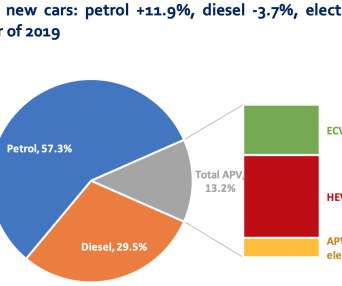4Q 2019: EU diesel demand continues to drop while gasoline gains; plug-ins up 80.5% y-o-y
Green Car Congress
FEBRUARY 9, 2020
In the last quarter of 2019, EU demand for diesel cars further decreased , dropping to 29.5% Gasoline cars accounted for 57.3% of the EU market, while electrically?chargeable Overall in 2019, almost 60% of all new cars registered in the European Union ran on gasoline (58.9%, compared to 56.6% Electrically?chargeable











Let's personalize your content